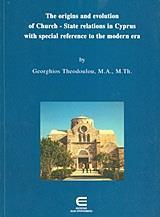THE ORIGINS AND EVOLUTION OF CHURCH-STATE RELATIONS IN CYPRUS WITH SPECIAL REFERENCE TO THE MODERN ERA
The subject of this book is a survey of the evolution of church-state relations in Cyprus from Antiquity, but with particular focus on the modern era, that is, the nineteenth and twentieth centuries. The objective is to provide a survey accounting for general and particular developments as well as highlighting various critical moments and issues.
After giving a sketch of the origins and early history of the Cyprus (lunch, I will concentrate on the emergence and development of the autocephalous Church of Cyprus from its origins in the fourth century. The historical autonomy of the Cyprus Church is very important to the history of the island because Orthodox Christianity managed to survive and thrive, in spite of so many invasions, due to the role played by the (lunch. The position of the ethnarchy (ethnarch= national leader) is central to the history of Cyprus. For the Archbishop of Cyprus as ethnarch was considered not only by the Greek Orthodox inhabitants of the island as their national leader, but also by the conquerors, especially by the Turks and the British.
I accordingly examine in detail the prerogatives and rights of the Archbishop of Cyprus granted during the Ottoman occupation (1571-1878) and also the acceptance of his leadership by the British administration (1878-1960). In the last two Chapters 1 stress that the role of the ethnarch, Archbishop Makarios III, leading up to the independence of Cyprus in 1960 is vital, as is evident during the negotiations with the British Government. It was he who signed, on behalf of the Greek population of Cyprus, the Zurich and London agreements by which the new State of Cyprus was established. It was also through his guidance and interventions that the new Cyprus constitution of 1960 was framed. This safeguarded the privileges of the Church, inherited from the time of the Ottoman Empire, and since Archbishop Makarios III was the Head of State from 1960-1977 nobody ever tried to dispute them.
Finally, I highl

 engine
🛠20220509.145534
engine
🛠20220509.145534





